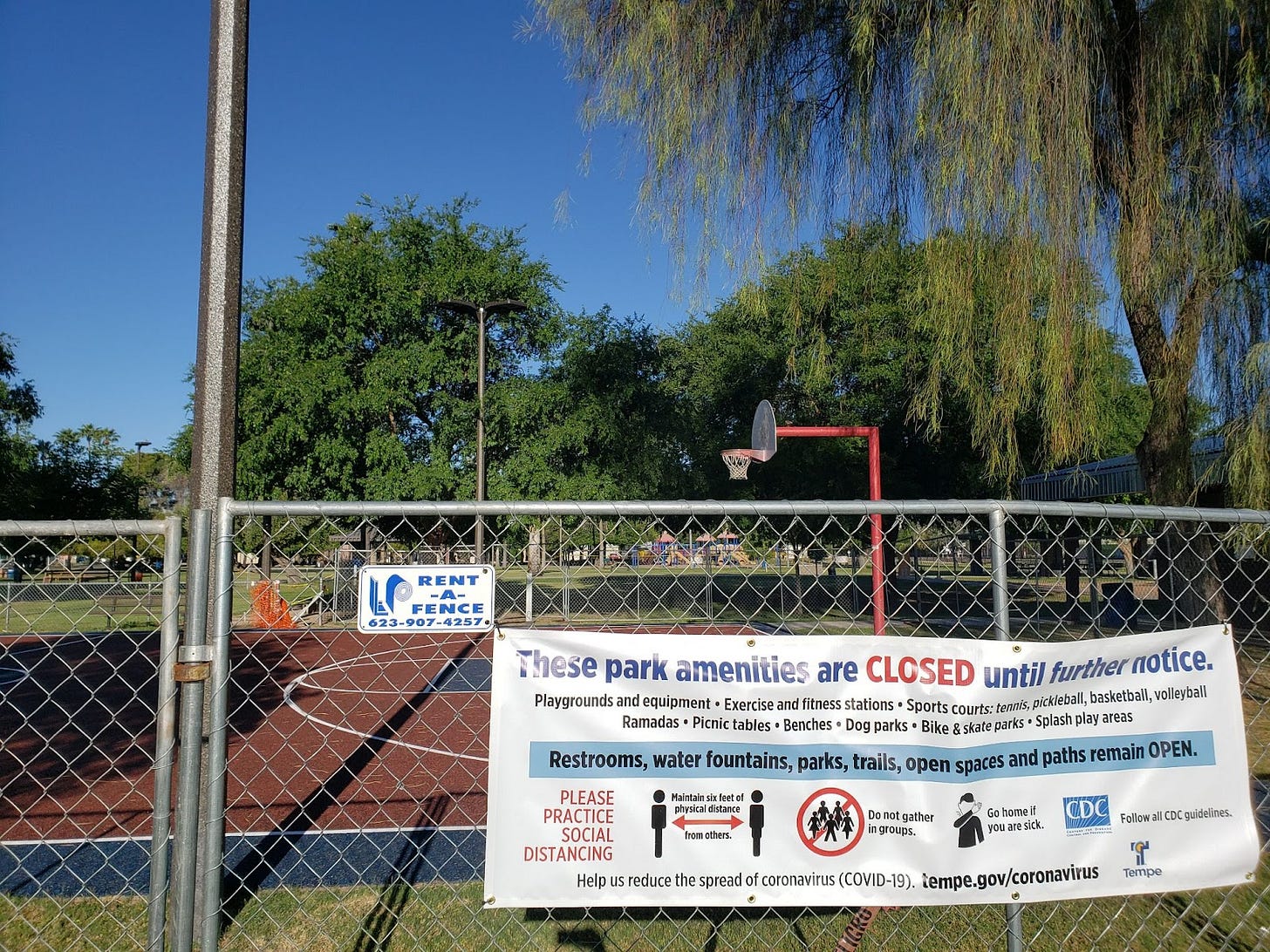Winds of change
But some things stay the same
Temperatures have been turning colder here in Phoenix, relatively speaking. Lately it’s been beautiful outside.
Drought watch: It’s looking to be a drier winter than normal in Arizona but possibly more snow in the Rocky Mountains, in what meteorologists are calling a “triple dip La Niña.” This follows a summer monsoon season that seemed solid, although it ended with slightly lower rainfall than average.
The Arizona Snowbowl in Flagstaff is already open for business for those who like to ski or snowboard.
There’s also a whiff of political change in the air. A Democrat, Katie Hobbs, was just elected governor. What it will mean for Arizona moving forward is anyone’s guess, because the state legislative majority remains in Republican hands.
The biggest surprise of the midterm elections for many Arizona politicos was that a Republican, Tom Horne, who is well past his political prime, unseated a widely respected Democrat, Kathy Hoffman, for the office of Superintendent of Public Instruction. One explanation for this surprise outcome is that voters were generally dissatisfied with the school experience during the pandemic.
We are now approaching three calendar years since the emergence of Covid-19. I don’t think many of us, still today, fully appreciate the impact that Covid had on American society.
A high school senior in Avondale, Markus Ceniceros, won a school board seat at an elementary school in the West Valley, saying he wants to be a voice for those who have experienced the academic struggles firsthand. From a KTAR report just before the final votes were tallied:
If elected, Ceniceros has big plans for the district. He wants to focus on the mental well-being of students, teachers and staff.
“I personally struggled a lot during the pandemic with my mental health, and I can only imagine what our educators and other students have gone through,” Ceniceros said.
Covid was devastating. Not only for people who lost loved ones. Not only for teachers and students. It destroyed real world social circles. As people grew weary of Zoom Happy Hours, many retreated into isolation, and many have not yet regrouped to a pre-Covid social lifestyle, simply due to new habits.
Scenes from the Covid hellscape — basketball edition
For a long time, nobody really knew what should be done about Covid. In hindsight, the politicians who advocated for “open” rather than “closed” have emerged looking better. This is because the negative consequences of prolonged isolation are coming into focus. Personally, I was genuinely conflicted during the early stages of the pandemic. It seemed unwise to continue life as usual when a new, highly contagious virus was spreading fast. For many people it presented symptoms significantly worse than the regular flu. Hospitals were overwhelmed. On the small chance I need a ventilator, would one be available? There were statistical markers of being safe, but nothing in life is guaranteed. Perhaps the media fed the fear a bit too much, and underplayed the tradeoffs involved with isolation. But the numbers were the numbers. At the end of the day, there never was a strictly data-driven solution to the Covid problem. It was a human dilemma and our society didn’t handle it very well.
(I realize Covid is still around, even though I’m writing about it in the past tense. For the moment I’m going to pretend like I’ve never heard anyone predicting something called a “tripledemic” this winter.)
I don’t know how much Covid had to do with Hoffman’s loss. Tom Horne did make some legitimate criticisms of the current school system. I agree with Horne about focusing on the basics, if that means teaching the fundamentals more effectively at the lower levels. However, I disagree that focusing on improving test scores will help us teach the basics more effectively. Our current regiment of standardized testing is an obstacle to good teaching and authentic learning. Increased coercion on improving test scores (as the tests are currently designed) will backfire in today’s public schools. The carrot is more powerful than the stick. We should focus on building vibrant learning environments and positive school cultures. Learning will improve along with morale.
Horne will also take office during the beginning stages of universal Educational Scholarship Accounts. Public dollars will go directly toward paying private school tuition; this option is available to any student in Arizona.
Another change that will have unpredictable outcomes.
ESAs might be an exciting time for “educational entrepreneurs” — but this does not describe the vast majority of teachers. I would make a guess that most teachers are risk averse. Most teachers want to get paid a decent salary to teach their subject matter in the classroom of a well-managed school. They want the security of predictable benefits and a pension. Most teachers don’t want to “compete” with public schools, even if that were mathematically possible with ESAs.
I applaud the advent of microschools and other creative experiments in education. My concern is that traditional public schools are being left to struggle under the weight of counterproductive policies that nobody cares enough to reform.
Maybe the traditional public school teacher is going the way of the dinosaur. We’ll see.
A Few Words on Democracy
The 2022 elections have been declared a “victory” for democracy because, across the country, none of the candidates for governor or secretary of state who promised to block the certification of an election for partisan reasons won their elections. That’s definitely a victory for those who believe voters should decide who becomes president of the United States.
But the republic will never be “safe.” That’s the whole point of the checks and balances built into our system of government. It is the responsibility of every generation to learn and teach the tenets of democracy. This includes “knowledge” of how our government works, the ideas behind it, and the history of how it has been changed over time. It also includes the “values” that underpin the Constitution. Values are best taught by example.
On the dangers of factionalism, from the Federalist Papers No. 10 (1787):
If a faction consists of less than a majority, relief is supplied by the republican principle, which enables the majority to defeat its sinister views by regular vote. It may clog the administration, it may convulse the society; but it will be unable to execute and mask its violence under the forms of the Constitution.
This document also distinguishes between a “republic” and a “pure democracy.” Being governed by online polls would be an example of a pure democracy.
Our republican system of representative democracy, split into three branches with separated powers, aims to provide the tools of preventing tyranny. It is left to each generation to use the tools well, or risk sliding into tyranny.
Links and News
Reading Kareem: I stumbled upon the Substack of Kareem Abdul-Jabbar and it has become one of my consistent reads. He writes about politics, culture, and sports. His typical post includes several segments, each with a link to a headline of a story, a short summary of the story, and then his opinion on the story. He summarizes the stories succinctly and fairly, and he writes well-reasoned opinions that readers can appreciate even if they happen to disagree. I’m also reading (and thoroughly enjoying) one of his books: “Coach Wooden and Me: Our 50-Year Friendship On and Off the Court.” Kareem was recently featured for an interview with Bari Weiss on her Substack Common Sense, although the full interview is for paid subscribers only.
George Orwell’s classic works to be published on Substack in “coffee break” segments. The Substack is called Orwell Daily. The current read is Orwell’s first book, “Down and Out in Paris and London”
The Phoenix Suns are paying homage to Native American tribes with a new jersey and home court design combination.
Another writer on Substack describes a negative experience on Twitter. Natalie Wexler writes the Minding the Gap newsletter, all about the cognitive aspects of teaching literacy in schools. She is now a refugee of EduTwitter. I’ve started to read her Substack archives, which are very interesting. Like this one from June: “Yes, National Tests Are Useful – But Not in “Reading”
Speaking of healthier social interaction online, this post-election exchange on the Arizona Agenda is more reasonable and thoughtful than anything you will find in the attention economy.
If you have any recommendations for books/articles to read or writers to follow, feel free to comment on this post or send me an email.
Final Thoughts
I made an error in my previous post. The email address for this publication is chollaexpress@substack.com. If you send an email to that address (or if you reply to this email) it will show up in my personal inbox. Many thanks to my email subscribers and to those who have shared this newsletter with others.
Cheers.





Natalie Wexler is great, and I recommend her book The Knowledge Gap at any chance I get.